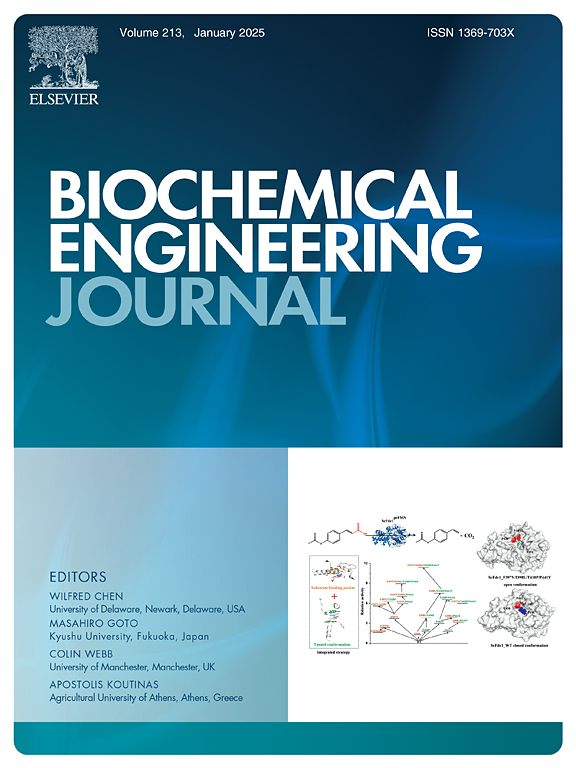Mechanistic insights into Fe²⁺/Sodium percarbonate pretreatment for optimizing volatile fatty acid yields from waste activated sludge
IF 3.7
3区 生物学
Q2 BIOTECHNOLOGY & APPLIED MICROBIOLOGY
引用次数: 0
Abstract
Anaerobic fermentation technology presents significant advantages in waste activated sludge treatment, encompassing sludge reduction, detoxification, and resource recovery, primarily by generating high-value volatile fatty acids (VFAs). This study systematically investigated the enhancement effects of Fe²⁺/sodium percarbonate (SPC) pretreatment on sludge disintegration and organic matter hydrolysis. The optimal pretreatment conditions (initial pH=3, SPC dosage=0.3 g/g TSS, Fe²⁺ dosage=0.3 g/g TSS) resulted in a maximum VFAs production of 1598 mg COD/L, representing a 7.26-fold increase compared to untreated sludge. Under these conditions, acetic acid accounted for 52.9 % of the total VFAs. The mechanistic analysis demonstrated that Fe²⁺/SPC pretreatment selectively enriched hydrolytic-acidogenic microbial communities while inhibiting VFAs-consuming populations, thereby directing metabolic flux toward acid accumulation. These findings establish an innovative technical approach and provide a mechanistic framework for advanced resource recovery from waste activated sludge.
Fe + /过碳酸钠预处理优化废活性污泥挥发性脂肪酸产率的机理研究
厌氧发酵技术主要通过产生高价值挥发性脂肪酸(VFAs),在废活性污泥处理中具有显著的优势,包括污泥减量、解毒和资源回收。本研究系统地考察了Fe 2 + /过碳酸钠(SPC)预处理对污泥分解和有机物水解的增强作用。在最佳预处理条件下(初始pH=3, SPC用量=0.3 g/g TSS, Fe 2 +用量=0.3 g/g TSS),最大VFAs产量为1598 mg COD/L,比未处理污泥提高7.26倍。在此条件下,乙酸占总VFAs的52.9% %。机制分析表明,Fe 2 + /SPC预处理选择性地富集了水解产酸微生物群落,同时抑制了vfas消耗种群,从而将代谢通量导向酸积累。这些发现建立了一种创新的技术方法,并为废弃活性污泥的高级资源回收提供了一个机制框架。
本文章由计算机程序翻译,如有差异,请以英文原文为准。
求助全文
约1分钟内获得全文
求助全文
来源期刊

Biochemical Engineering Journal
工程技术-工程:化工
CiteScore
7.10
自引率
5.10%
发文量
380
审稿时长
34 days
期刊介绍:
The Biochemical Engineering Journal aims to promote progress in the crucial chemical engineering aspects of the development of biological processes associated with everything from raw materials preparation to product recovery relevant to industries as diverse as medical/healthcare, industrial biotechnology, and environmental biotechnology.
The Journal welcomes full length original research papers, short communications, and review papers* in the following research fields:
Biocatalysis (enzyme or microbial) and biotransformations, including immobilized biocatalyst preparation and kinetics
Biosensors and Biodevices including biofabrication and novel fuel cell development
Bioseparations including scale-up and protein refolding/renaturation
Environmental Bioengineering including bioconversion, bioremediation, and microbial fuel cells
Bioreactor Systems including characterization, optimization and scale-up
Bioresources and Biorefinery Engineering including biomass conversion, biofuels, bioenergy, and optimization
Industrial Biotechnology including specialty chemicals, platform chemicals and neutraceuticals
Biomaterials and Tissue Engineering including bioartificial organs, cell encapsulation, and controlled release
Cell Culture Engineering (plant, animal or insect cells) including viral vectors, monoclonal antibodies, recombinant proteins, vaccines, and secondary metabolites
Cell Therapies and Stem Cells including pluripotent, mesenchymal and hematopoietic stem cells; immunotherapies; tissue-specific differentiation; and cryopreservation
Metabolic Engineering, Systems and Synthetic Biology including OMICS, bioinformatics, in silico biology, and metabolic flux analysis
Protein Engineering including enzyme engineering and directed evolution.
 求助内容:
求助内容: 应助结果提醒方式:
应助结果提醒方式:


